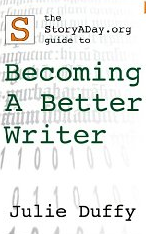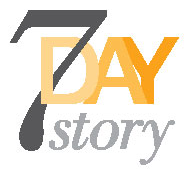Julie Duffy's Blog, page 177
July 24, 2013
[Writing Prompt] 500 words

Brevity is the name of the game this week.
The Prompt
Write a story that is exactly 500 words long.
That means you have about 50 words to set things up, 100 words send your character out on their adventure, 200 words to introduce a complication, 125 words for the crisis and climax, and 25 more words for your pithy summing up.
If you need a theme, use this: your character needs to do something/get somewhere quickly. Time is brief, as is your word count.
Go!




July 19, 2013
Best of the Web for Short Story Writers July 1-14, 2013
Here’s the current round-up of Great Reads for short story writers this month:
Charlotte Rains Dixon: Can Writing Set You Free?
“–Writing can free you to be who you are meant to be. Truly, there’s no faster path to self-knowledge (and yes it is important) than writing…”
Write To Done: The Secret Fear of Every Writer — And How To Subdue It
“We don’t talk about this hidden fear because if our life is writing, then everything we are is wrapped up in what we have to say. If we doubt what we have to say, don’t we then doubt who we are?”
Killer Chicks: What You Put Into it
“The real question most days is, how hard do I want to fight for it? It’s so easy to get discouraged and feel like I’m working twice as hard and getting half as much. When I start to feel that way, I have to stop and remind myself that this isn’t an all or nothing endeavor.”
Time To Write: For Those Of Us Not As Cute As Mickey
“We do what we really consider most important at the time, so this post isn’t about doing more. It’s about giving up excuses… ”
Angela Booth: Just Write
“You’ll second-guess yourself every moment of every day as you write…”
ZenHabits: Why Fear of Discomfort Might Be Ruining Your Life
Not exclusively aimed at your writing life, but easily applied to it…
GalleyCat: Avoiding The Passive Voice…With Zombies
A fun and foolproof way to identify the passive voice…
Women On Writing: What Veteran Writers Know
It’s all about the rewrite…
Bestseller Lee Child On Creating Suspense
“Trusting such a simple system feels cheap and meretricious while you’re doing it. But it works. It’s all you need…”
What great articles have YOU read this month so far?




July 15, 2013
Becoming A Better Writer: The eBook
One of my main aims with StoryADay.org was to get you (and me) writing again. It’s about productivity, creativity and becoming the person you were meant to be: a writer.
But after you’ve been writing for a while a new worry creep in. You’re no longer worried about making time to write, or whether you’ll be able to finish stories. You’ve proved that you can do that. You’ve probably found that you’re much happier when you’re writing than when you’re not.
Then comes that next niggling worry.
(And yes, it hit me too, after I’d first used StoryADay to jumpstart my own short story writing).
And what is that worry? All together now:
“What if my writing isn’t good enough?”
Facing Reality/Changing Reality
If you’ve been writing for a while now, you’ve probably sent a story or two away to a publication, a contest, a friend. Maybe you had some luck and got a good response. Chance are though, you to a ‘sorry but’, or an empty inbox.
It’s hard to know why. Maybe it wasn’t what that person was looking for. Or maybe it really wasn’t good enough. So now what?
As I see it, you have three choices:
1. Give up (but that’s not a real choice because you already know you want to be writing. So let’s forget I ever mentioned it.)
2. Never show your work to anyone again (but this isn’t realistic either. We write to connect. You WANT to find an audience for your work.)
3. Become a better writer.
Let’s Do It
Every writer has to face this reality, when the first euphoria wears off: we’re not as good as we want to be. Everyone. From Stephen King to Junot Diaz (who got a McArthur “Genius” grant this year. Think that’s going to make feel like he knows what he’s doing? Nope!)
It’s all just part of the process of becoming a writer.
So it’s noses to the grindstone again: write, read, revise, learn, do it all again. The only way forward is, well, forward.
A Free eBook For You
 Earlier this year I posted a long series of articles on the subject of Becoming A Better Writer. They were so popular that I decided to expand them, compile them, and release them as an ebook: the second in the StoryADay.org Guides series.
Earlier this year I posted a long series of articles on the subject of Becoming A Better Writer. They were so popular that I decided to expand them, compile them, and release them as an ebook: the second in the StoryADay.org Guides series.
It’s available now and, for this week only, it’s FREE.
This guide to becoming a better writer is packed with tips, techniques and exercises you can use to improve your writing– even when you’re away from your desk. With StoryADay’s trademark brand of inspiration, practical help, and humor, this is your go-to guide for whenever your writing life needs a boost.
What’s The Catch?
Well, none really. You need to have a Kindle or download the free Kindle software from Amazon, and I’d love it if you’d leave a review so that more people can find the book next week when the price goes back up to $2.99 (Any kind of review helps. I think it potential readers like to see a balanced set of opinions up there) .
Which reminds me, it’s only free until Friday, July 19th, so get your copy today.




July 11, 2013
Help! I’m Drowning In Ideas!
Help! I’m suffering an explosion of creativity and I can’t seem to stop myself finding time and ideas for writing!
How It All Began
One recent evening I tucked myself into my armchair, put my feet up, pulled my knitting on to my lap and settled down in the flickering black and white light coming from my television as we fired up a couple of episodes of The Twilight Zone — our nightly non-guilty pleasure.
I love The Twilight Zone. The stories are so imaginative, they’re not afraid to take a dark turn (!); they’re stylish, well-crafted and intellectually stimulating.
I’ve been telling myself that they’re great research for my own story telling efforts.
And in a way they are. They’re all about a character (often a man, aged 36, oddly enough) who needs something, lacks something, wants something. Great stuff for storytellers.
But at the end of every Season 1 episode, I keep seeing this little line of text that makes me uneasy.
The line?
“Based on the short story…”
Short Stories Are Not Screenplays
I follow a lot of working writers’ blogs, but people who are getting paid to write the equivalent of short stories now are often working in TV. The influences they cite are other TV shows and writers. I follow those links and spend hours reading about how those other writers write and find success.
But I’m not writing screenplays. I need to remind myself how to show a scene in words, not images.
So I’ve embarked on another challenge (you know how I love a challenge, right?) and I invite you to come along with me.
Following Ray Bradbury’s prescription for writers (watch it here. It’s worth the time) I’m trying to read a short story every day, especially those from the late 19th and early 20th centuries — stories with some staying-power. I’m also trying to read one essay a day (though accessible, classic essays are proving harder to find than good short stories) and one poem a day (oddly enough, though poems are shorter, I’m finding it harder to rouse myself to do this part of the program).
The Results Are In
I’ve been doing this for just over a week and, as I said, I’ve been ‘suffering’ under an explosion of creativity. I’ve written one, long-for-me, 6,000 word short story and sketched out ideas for more than 50 more (yes, 5-0!) in a few different themes/genres, started my second story and written four blog posts.
And my kids are on vacation!
But I can’t seem to stop myself finding time to read and write.
I’ve rediscovered the of both reading and writing. I’m sneaking off, staying up late, ignoring people I love, to read — and little of it is on Facebook or Feedly or Twitter. I’m reading well-crafted fiction and non-fiction that has stood the test of time. And I’m bursting with ideas, references and imagery — I’m so full of ideas that I can’t hold them back. I simply have to write. (This is not always the case with me. I always feel better when I’m writing but I’m quite good at being lazy and grumpy instead).
Want to join me in being more creative, more productive, and more joyful? Start reading and writing today!
Here are some of the books I’m using to find short stories, poetry,
July 9, 2013
[Writing Prompt] Journeys

photo by K. J. Duffy
I’m reading an autobiography written in the 1830s — when steam travel was the new big thing. The author (a mother of small children) just gave a vivid and opinionated account of a trip she took from Philadelphia to Baltimore. With very few words she conjoured the layout of the carriages and the hot, smoky atmosphere inside — heated as it was by a coal-fired, iron stove in the middle of the carriage (no health and safety, clean air regulations in the 1830s!). She told an amusing story of an encounter with a fellow passenger, while she was at it. I feel like I was ON the train with her.
The Prompt
Tell The Story Of A Journey
Use any transportation technology you can dream up, but include details to allow us to see, feel and perhaps even choke on the atmosphere.
Don’t forget to make something happen, and then resolve it (or leave it unresolved).
Give us a character we can root for (or against).




July 8, 2013
[Reading Room] Boule de Suif by Guy de Maupassant
This is an extraordinary story, and the one that sky-rocketed Guy de Maupassant to literary stardom. I can see why.
Unlike many stories written in the later 19th Century I found this one immensely accessible. The language was vivid yet not convoluted (perhaps because it has been tranlated from the original French?) and the characters intense and vivid.
It is set during the Franco-Prussian war (and if you don’t know much European history, the lively description of the occupation of French towns by the German armies in the 1800s does a lot to set the stage for what happened during the two world wars at the start of the 20th century).
The story has a longer set-up than modern stories tend to. The author spends a lot of time setting the scene before what we would call ‘the inciting incident’ that gets the story underway, but somehow it doesn’t drag. It is fascinating and descriptive and energetic and I couldn’t stop reading, even though I had no idea yet who the main characters were going to be or what the story was ‘about’.
When things do get rolling (literally) we embark on a long carriage ride with an unlikely group of companions who are thrown together by their desire to escape their occupied town and their wealth, which gives them the means to do so. Wealth, of course, is no indicator of social class and de Maupassant populates the carriage with a fascinating bunch of characters. Yes, they are largely stereotypes (much as the characters in Dickens often are) but they each have enough color to make it seem possible they might actually be real.
The story crests along with false starts and it teases us that things are going to turn out one way until we reach a point of no return. Now all that scene-setting and character-building de Mauppassant has been doing finally pays off as the story slides to its inevitable conclusion. The masterful part is that, like someone watching a mudslide or avalanche engulf a pretty mountain village, the reader can’t help but root for a miraculous change of course.




July 3, 2013
What Are The Last Three Books You Opened?
I don’t know about you, but I find it hard to write in the summer. My kids are off school, my friends are calling, people come to visit…
I still write, but I scale back my ambitions. And I use the snatches of time I do have, to read.
But not just anything. I’m cutting back on reading ABOUT writing, and focussing more on readiung some great writing by the masters.
So, what are the last three books I opened?
I’m trying to read a poem a day, so I picked up this volume of Frost poems and it fell open to After Apple Picking. I didn’t love it at first but I read it (slowly) a couple of times more and wrote it out once. I still didn’t love it, but I did find it a useful exercise and got much more out of it that way.
The Great English Short-Story Writers, Volume 1
I read Dr. Heidegger’s Experiement, which left me with a strong sense of the history of the short story and what a robust form it really is.


Cooked by Michael Pollan
I’ve always enjoyed Michael Pollan’s writing style. It really proves that anything can be interesting if the writer has a passion for it and that all good writing is storytelling.
Bonus Fourth Book:


The Battle of the Labyrinth (Percy Jackson and the Olympians) by Rick Riordan
My eight year old and I are reading it together at bedtime. Mostly I read it but sometimes he reads it. We love reading out loud. Do/did you still read to children once they can read for themselves?
How about you? Leave a comment telling us what were the last three books you opened.




July 2, 2013
[Writing Prompt] Holiday Stories
This week sees both Independence Day in the US and Canada Day in the north of the continent.
The Prompt
Write a holiday-themed story
Tips
It doesn’t have to be related to this week’s holidays. If fact you might want to start planning ahead for autumnal and winter holidays, especially if you’re interested in releasing those stories this year.
Did you know that magazines, online publications and anthologies are starved for date-appropriate stories?
And think about it, these stories are evergreen: release them yourself and talk them up every year on the same date. Or how about putting together a collection of date themed stories and releasing them as themed anthology of your own writing?
We’ve all lived through holidays – from the ones that give you a day off school, to the ones that come replete with custom and tradition and obligation and anticipation. Use your own experiences to bring the story (and its details) alive for the reader, but don’t forget to include a vivid character with a strong desire for…something.




June 29, 2013
Best of the Web for Short Story Writers – June 2013
From the Women On Writing Blog: an inspiring article about how to get through those days when your confidences goes out from underneath you.
LINK: http://muffin.wow-womenonwriting.com/...
29 Ways To Stay Creative
A fun, short video from TO-FU, full of cheerful ways to keep your creative well topped up.
LINK: http://vimeo.com/24302498
Six Questions for Kristy Harding, Founder, Paper Tape
This is part of an ongoing series at the Six Questions blog, which asks, youguessed it, six questions of aquisitions editors at fiction publications,t o find out what they really want from writers.
LINK: http://sixquestionsfor.blogspot.com/2...
Flash Fiction Challenge from the Terrible Minds Blog
Every Friday, or so, Chuck Wendig challenges his readers to write a flash fiction story. The prompts can be weird and wonderful, but this one is one you can use over and over again.
LINK: http://terribleminds.com/ramble/2013/...
Spend An Hour With Ray Bradbury
Jurgen Wolff shares a wonderful video of a lecture given by Ray Bradbury, and a nice summary of the contents, along with Bradbury’s prescription for becoming a fulfilled writer.
LINK: http://timetowrite.blogs.com/weblog/2...
The Pomodoro Technique for Writers
An interesting article at Write To Done about how using this block-writing technique can help writers get more done. The article focusses on non-fiction writing, but could just as easily help you with a fast first draft of a short story.
LINK: http://writetodone.com/2013/06/24/how...




June 25, 2013
[Writing Prompt] Mining Your Memories
 Don’t forget: at 1PM (EST) today (Wednesday) I’m hosting a webinar on how to write, revise and release a story all in one week, with DIYMFA’s Gabriela Pereira. And we have a special announcement. Register Now
Don’t forget: at 1PM (EST) today (Wednesday) I’m hosting a webinar on how to write, revise and release a story all in one week, with DIYMFA’s Gabriela Pereira. And we have a special announcement. Register Now


Last week Neil Gaiman’s new novel The Ocean At The End of the Lane came out.
I like his books. But I LOVE his online journal. So on reading the book, it was clear straight away, that he was mining his personal memories: both as an adult attending his father’s funeral (which he did in reality a few years ago, and blogged about) and as a child growing up (one county over from where I would grow up during the following decade).
I’m reading the book slowly, but so far here’s what I see: the details. The details — of what the child sees, where the adult goes — are startlingly clear and appropriate to each voice. The adult goes for a drive to avoid the funeral hooplah, and sees the world as it is and how it has changed. The child looks unflinchingly at a dead body until he is hustled away by the grown ups. But he notes, disgruntled, that the body is draped in a blanket from his own bedroom. He takes in details of the body looked unlike the person as they had been, alive. He measures money in how many four-for-a-penny Blackjacks and Fruit Salads it can buy him (the pervasive, child-accessible sweeties/candies of Mr. Gaiman’s and my childhoods!).
The Prompt
Write a story based on one strong image from your childhood — or at least a decade ago
It doesn’t need to be anything as shocking as discovering a dead body. Just take a vivid memory-image and weave a story around it. Have your characters recall details that you recall. Have them feel the way you felt.
For instance, I remember being allowed (encouraged?) to visit an elderly neighbour of ours when I was very young. I went round one day and saw, in a window above her living room window, a stranger, cleaning her windows from the inside. This person was wearing a white, sleeveless top, hair slicked back, cheeks red. I can remember that the house was attached to other houses on either side, built of brick. The windows were sash windows. The door was up a step from the long path that ran between two strips of lawn. There was a garden gate made of wood with one of those metal latches you have to lift to open it. I still remember the physical sensations I felt when I said…
I *know* this character. I know the mistake she’s about to make and her reaction to it. Now, can I put that into a story where it turns out that the person upstairs is not who Mrs McKay thinks it is? Can I have my character go on to make a similar but bigger mistake? Can I have her triumph over her personality flaws, or will she be defeated by them?
What memory will you write about?









